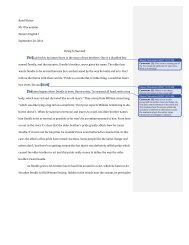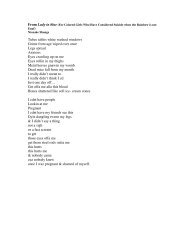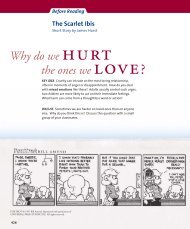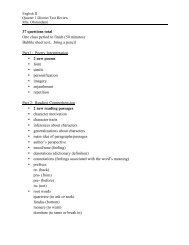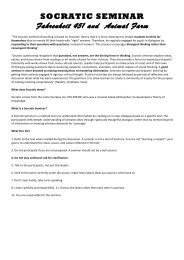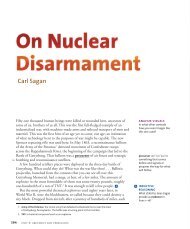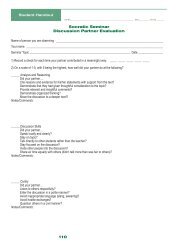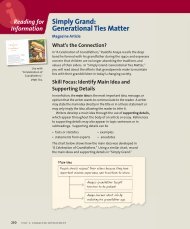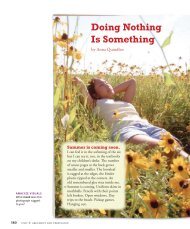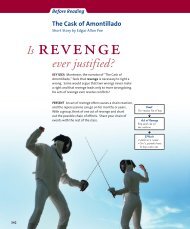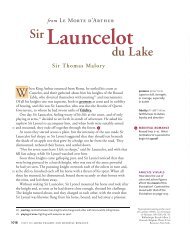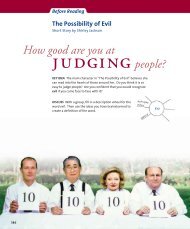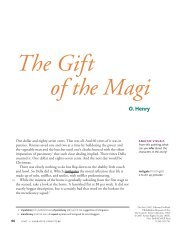The Language of Poetry - LanguageArts-NHS
The Language of Poetry - LanguageArts-NHS
The Language of Poetry - LanguageArts-NHS
Create successful ePaper yourself
Turn your PDF publications into a flip-book with our unique Google optimized e-Paper software.
poetic form: lyric poetry<br />
A lyric poem is a short poem in which a single speaker<br />
expresses personal thoughts and feelings on a subject. In<br />
ancient Greece, lyric poets expressed their feelings in song,<br />
accompanied by a lyre. While modern lyric poems are no<br />
longer sung, they still retain common characteristics such as:<br />
• a sense <strong>of</strong> rhythm and melody<br />
• imaginative language<br />
• exploration <strong>of</strong> a single feeling or thought<br />
Reading the lyric poems on the following pages aloud will help<br />
you appreciate these characteristics.<br />
literary analysis: figurative language<br />
Figurative language is an expression <strong>of</strong> ideas beyond what the<br />
words literally mean. Three basic types <strong>of</strong> figurative language,<br />
or figures <strong>of</strong> speech, follow:<br />
• A simile compares two unlike things that have something<br />
in common, using like or as. (bats, sailing like kites)<br />
• A metaphor compares two unlike things by saying that one<br />
thing actually is the other. (bats, snub seven-pointed kites)<br />
• Personification lends human qualities to an object, animal,<br />
or idea. (bats, performing a graceful ballet)<br />
Poets use figurative language both to convey abstract thoughts<br />
and to <strong>of</strong>fer a fresh outlook on everyday things. As you read<br />
the following poems, use a chart like this one to record and<br />
analyze examples <strong>of</strong> simile, metaphor, and personification.<br />
Example Type Two Things<br />
Compared<br />
“I dwell in<br />
Possibility—/ A<br />
fairer House than<br />
Prose–”<br />
metaphor poetry/possibility<br />
and a house<br />
reading skill: compare and contrast<br />
Ideas<br />
Suggested<br />
Comparing and contrasting the poems—identifying the<br />
similarities and the differences between them—will help you<br />
understand each poem’s central theme. As you read, compare<br />
the feelings expressed and the figurative language used.<br />
Emily Dickinson:<br />
Passionate Poet<br />
As an adult, Emily<br />
Dickinson rarely left<br />
her father’s home or<br />
welcomed visitors.<br />
Yet she managed to<br />
write poems that<br />
are remarkable for<br />
their originality and<br />
awareness <strong>of</strong> human<br />
passion. Using unusual<br />
imagery and syntax,<br />
she explored such powerful emotions as<br />
love, despair, and ecstasy.<br />
Denise Levertov:<br />
A Poetic Vocation<br />
Denise Levertov’s<br />
view that writing<br />
poetry should be like<br />
a religious calling was<br />
influenced by the early<br />
20th-century poet<br />
Rainer Maria Rilke,<br />
whom she claimed as<br />
a role model. Levertov<br />
<strong>of</strong>ten used her art in<br />
service <strong>of</strong> political<br />
ideals, tackling such issues as the Vietnam<br />
War and the nuclear arms race.<br />
Lucille Clifton:<br />
Honoring Heritage<br />
Lucille Clifton’s<br />
poetry honors African<br />
heritage and expresses<br />
optimism about life.<br />
Clifton is a pr<strong>of</strong>essor<br />
<strong>of</strong> humanities at<br />
St. Mary’s College,<br />
which boasts a<br />
premier varsity sailing<br />
program. Sailboat<br />
races there may have<br />
inspired “blessing the boats.”<br />
Emily Dickinson<br />
1830–1886<br />
Denise Levertov<br />
1923–1997<br />
Lucille Clifton<br />
born 1936<br />
more about the author<br />
For more on these poets, visit the<br />
Literature Center at ClassZone.com.<br />
705



